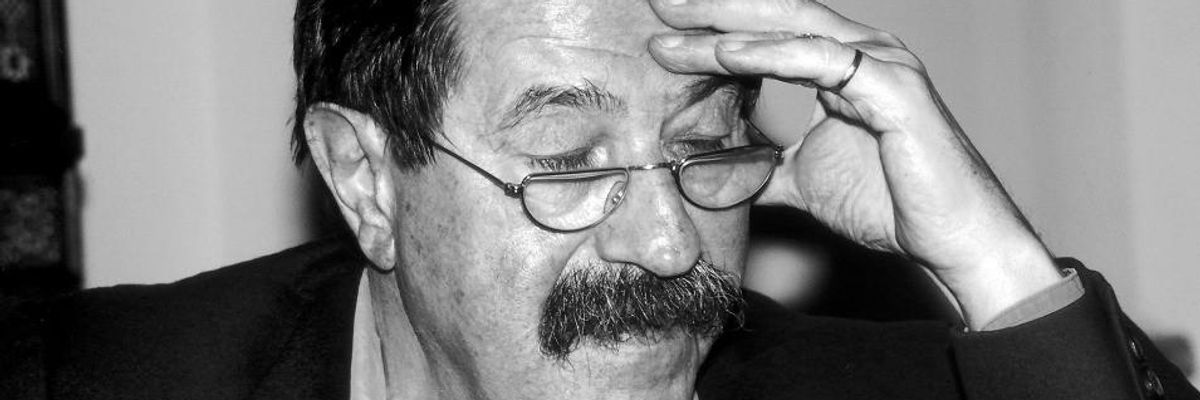

SUBSCRIBE TO OUR FREE NEWSLETTER
Daily news & progressive opinion—funded by the people, not the corporations—delivered straight to your inbox.
5
#000000
#FFFFFF
To donate by check, phone, or other method, see our More Ways to Give page.


Daily news & progressive opinion—funded by the people, not the corporations—delivered straight to your inbox.

Gunter Grass died April 13, 2015.
Nobel-award winning author and social critic Gunter Grass, who died this week at the age of 87, said in his final interview that he worried humanity--now 15 years into the 21st century--could be "sleepwalking" into another world war.
"We have on the one side Ukraine, whose situation is not improving; in Israel and Palestine things are getting worse; the disaster the Americans left in Iraq, the atrocities of Islamic state and the problem of Syria," he told the Spanish newspaper El Pais in the interview, which took place at the author's home in northern Germany on March 21 and was published Tuesday, the day after his death.
"There is war everywhere; we run the risk of committing the same mistakes as before; so without realizing it we can get into a world war as if we were sleepwalking," he added, also expressing concern about climate change and overpopulation.
The novelist, poet, playwright, and essayist, who pushed his fellow Germans to confront even the most controversial aspects of their history, was known by some as the "conscience of his generation."
Trump and Musk are on an unconstitutional rampage, aiming for virtually every corner of the federal government. These two right-wing billionaires are targeting nurses, scientists, teachers, daycare providers, judges, veterans, air traffic controllers, and nuclear safety inspectors. No one is safe. The food stamps program, Social Security, Medicare, and Medicaid are next. It’s an unprecedented disaster and a five-alarm fire, but there will be a reckoning. The people did not vote for this. The American people do not want this dystopian hellscape that hides behind claims of “efficiency.” Still, in reality, it is all a giveaway to corporate interests and the libertarian dreams of far-right oligarchs like Musk. Common Dreams is playing a vital role by reporting day and night on this orgy of corruption and greed, as well as what everyday people can do to organize and fight back. As a people-powered nonprofit news outlet, we cover issues the corporate media never will, but we can only continue with our readers’ support. |
Nobel-award winning author and social critic Gunter Grass, who died this week at the age of 87, said in his final interview that he worried humanity--now 15 years into the 21st century--could be "sleepwalking" into another world war.
"We have on the one side Ukraine, whose situation is not improving; in Israel and Palestine things are getting worse; the disaster the Americans left in Iraq, the atrocities of Islamic state and the problem of Syria," he told the Spanish newspaper El Pais in the interview, which took place at the author's home in northern Germany on March 21 and was published Tuesday, the day after his death.
"There is war everywhere; we run the risk of committing the same mistakes as before; so without realizing it we can get into a world war as if we were sleepwalking," he added, also expressing concern about climate change and overpopulation.
The novelist, poet, playwright, and essayist, who pushed his fellow Germans to confront even the most controversial aspects of their history, was known by some as the "conscience of his generation."
Nobel-award winning author and social critic Gunter Grass, who died this week at the age of 87, said in his final interview that he worried humanity--now 15 years into the 21st century--could be "sleepwalking" into another world war.
"We have on the one side Ukraine, whose situation is not improving; in Israel and Palestine things are getting worse; the disaster the Americans left in Iraq, the atrocities of Islamic state and the problem of Syria," he told the Spanish newspaper El Pais in the interview, which took place at the author's home in northern Germany on March 21 and was published Tuesday, the day after his death.
"There is war everywhere; we run the risk of committing the same mistakes as before; so without realizing it we can get into a world war as if we were sleepwalking," he added, also expressing concern about climate change and overpopulation.
The novelist, poet, playwright, and essayist, who pushed his fellow Germans to confront even the most controversial aspects of their history, was known by some as the "conscience of his generation."